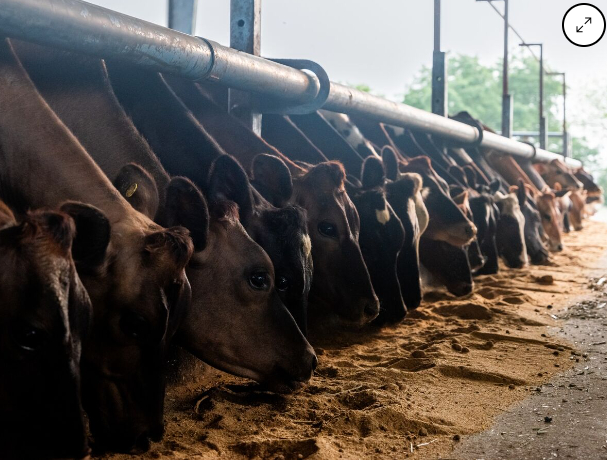November 28, 2025 | 03:59 GMT +7
November 28, 2025 | 03:59 GMT +7
Hotline: 0913.378.918
November 28, 2025 | 03:59 GMT +7
Hotline: 0913.378.918

The food industry’s climate footprint is immense, accounting for about a third of global greenhouse gases. Livestock, which releases potent methane, makes up 14.5% of worldwide emissions.
Photographer: Anindito Mukherjee/Bloomberg
Disclosed emissions from the world’s 20 largest publicly-listed meat and dairy companies rose 3.3% from 2022 levels, according to a report by investor network FAIRR Initiative. Its analysis includes companies like Hormel Foods Corp. and China’s New Hope Liuhe Co., which supply household names like Walmart Inc. and McDonald’s Corp.
The food industry’s climate footprint is immense, accounting for about a third of global greenhouse gases. Livestock, which releases potent methane, makes up 14.5% of worldwide emissions. The Science-Based Targets initiative, a UN-backed agency that evaluates companies’ net-zero goals, recommends that the food and agriculture sector cuts emissions by 3% a year between 2020 and 2030.
“The sector is just not on track,” said Thalia Vounaki, senior manager for research and engagements at FAIRR.
That underlines the need to focus on food and agriculture as world leaders gear up for the upcoming COP28 summit in Dubai later this month, FAIRR said in its report. The group of investors raises awareness about the environmental, social and governance risks and opportunities in the global food sector, and is backed by more than $70 trillion in assets.
The United Arab Emirates has called for commitments to transform the food industry, while the United Nations’ Food and Agriculture Organization is set to unveil a net-zero roadmap for the sector.
FAIRR’s report highlights that some companies have managed to reduce their emissions, such as Tyson Foods Inc. and Danone SA. But overall there are varying levels of climate commitments and disclosure, it said. Almost two-thirds of the companies it analyzed didn’t disclose so-called Scope 3 emissions, which include those that occur indirectly along a company’s value chain. Only four out of top 20 companies in the sector have net-zero aims.
“We need to get these companies up to the same standard, irrespective of where they’re sitting,” Oshni Arachchi, head of active ownership at Danske Bank A/S, said in an interview.
FAIRR’s sixth protein producer index has highlighted improvements made by the livestock industry, including in areas like alternative proteins, waste and pollution and water use, it said. While that shows “bad practice is not an inevitable part of the food supply ecosystem,” the investor group urged for more progress on environmental aspects.
“We’ve long known that humanity can’t fix climate change without fixing the way we feed the world,” according to Jeremy Coller, private equity investor and founder of FAIRR.
(Bloomberg)

(VAN) A new study reveals how the simultaneous effects of ocean acidification, salinity and loss of oxygen are making the world more fragile.

(VAN) Hopes are growing that the creation of the first 3D turkey gut model could be a turning point in the battle against the virulent blackhead disease.

(VAN) Tyson, America’s biggest meat supplier, plans to shutter one of its largest beef processing plants as the industry continues to struggle with low cattle supplies and political pressure from Washington.

(VAN) New FAO study shows how digital solutions are empowering farmers and fishers to prevent losses and build resilient agrifood systems.

(VAN) Brazil's COP30 presidency pushed through a compromise climate deal on Saturday that would boost finance for poor nations coping with global warming but that omitted any mention of the fossil fuels driving it.

(VAN) Poultry farmers in the UK have been warned that they could face one of the worst winters yet for bird flu.

(VAN) Prices of main-crop paddy have risen sharply, with jasmine rice hitting 16,100 baht per tonne — the highest level in years.